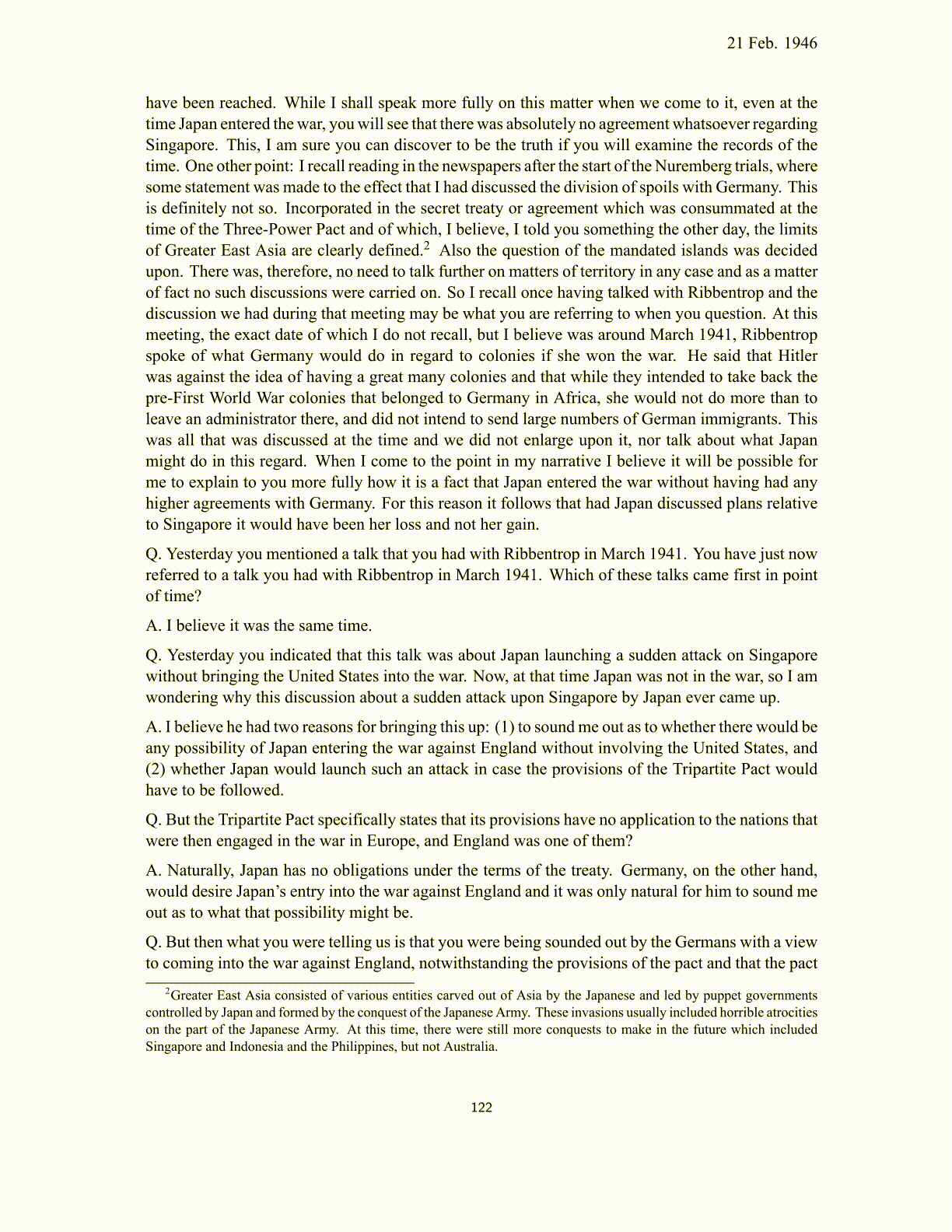
21 Feb. 1946 have been reached. While I shall speak more fully on this matter when we come to it, even at the time Japan entered the war, you will see that there was absolutely no agreement whatsoever regarding Singapore. This, I am sure you can discover to be the truth if you will examine the records of the time. One other point: I recall reading in the newspapers after the start of the Nuremberg trials, where some statement was made to the effect that I had discussed the division of spoils with Germany. This is definitely not so. Incorporated in the secret treaty or agreement which was consummated at the time of the Three-Power Pact and of which, I believe, I told you something the other day, the limits of Greater East Asia are clearly defined. 2 Also the question of the mandated islands was decided upon. There was, therefore, no need to talk further on matters of territory in any case and as a matter of fact no such discussions were carried on. So I recall once having talked with Ribbentrop and the discussion we had during that meeting may be what you are referring to when you question. At this meeting, the exact date of which I do not recall, but I believe was around March 1941, Ribbentrop spoke of what Germany would do in regard to colonies if she won the war. He said that Hitler was against the idea of having a great many colonies and that while they intended to take back the pre-First World War colonies that belonged to Germany in Africa, she would not do more than to leave an administrator there, and did not intend to send large numbers of German immigrants. This was all that was discussed at the time and we did not enlarge upon it, nor talk about what Japan might do in this regard. When I come to the point in my narrative I believe it will be possible for me to explain to you more fully how it is a fact that Japan entered the war without having had any higher agreements with Germany. For this reason it follows that had Japan discussed plans relative to Singapore it would have been her loss and not her gain. Q. Yesterday you mentioned a talk that you had with Ribbentrop in March 1941. You have just now referred to a talk you had with Ribbentrop in March 1941. Which of these talks came first in point of time? A. I believe it was the same time. Q. Yesterday you indicated that this talk was about Japan launching a sudden attack on Singapore without bringing the United States into the war. Now, at that time Japan was not in the war, so I am wondering why this discussion about a sudden attack upon Singapore by Japan ever came up. A. I believe he had two reasons for bringing this up: (1) to sound me out as to whether there would be any possibility of Japan entering the war against England without involving the United States, and (2) whether Japan would launch such an attack in case the provisions of the Tripartite Pact would have to be followed. Q. But the Tripartite Pact specifically states that its provisions have no application to the nations that were then engaged in the war in Europe, and England was one of them? A. Naturally, Japan has no obligations under the terms of the treaty. Germany, on the other hand, would desire Japan’s entry into the war against England and it was only natural for him to sound me out as to what that possibility might be. Q. But then what you were telling us is that you were being sounded out by the Germans with a view to coming into the war against England, notwithstanding the provisions of the pact and that the pact 2 Greater East Asia consisted of various entities carved out of Asia by the Japanese and led by puppet governments controlled by Japan and formed by the conquest of the Japanese Army. These invasions usually included horrible atrocities on the part of the Japanese Army. At this time, there were still more conquests to make in the future which included Singapore and Indonesia and the Philippines, but not Australia. 122